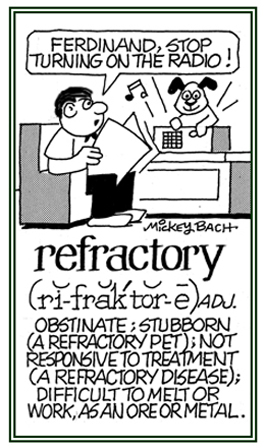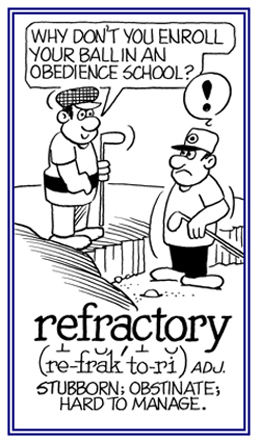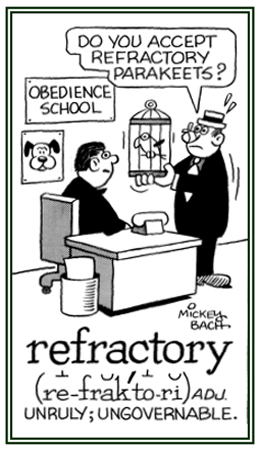frag-, frang-, fract-, fring-
(Latin: break, breaking; broken; cracked)
refract (verb), refracts; refracted; refracting
1. To alter the course of a wave of motion: When energy is refracted, that course of the wave passes into something from another medium; such as, what water does to light entering it from the air.
3. Etymology: from Latin refract, the past participle of refringere "to break off, to break back" from frangere, "to break".
When anyone refracts light, radio waves, etc. he or she could be measuring the degree of focusing characteristics in a lens or eyes.
2. To alter the appearance of something by viewing or showing it through a different medium: Refracting or deflecting light, for example, from a straight path by turning or bending a wave; such as, a light or a sound wave.3. Etymology: from Latin refract, the past participle of refringere "to break off, to break back" from frangere, "to break".
1. The change in direction that occurs when a wave of energy; such as, when light passes from one medium to another of a different density, for example, from air to water.
2. The degree to which the apparent position of an astronomical object is distorted by the redirection of its light as it passes through the earth's atmosphere.
3. In ophthalmology, the ability of the eye to change the direction of light in order to focus it on the retina.
4. Etymology: from Late Latin refractionem, refractio, "a breaking up", from Latin refractus, past participle of refringere, "to break up", from re-, "back" + frangere, "to break".
2. The degree to which the apparent position of an astronomical object is distorted by the redirection of its light as it passes through the earth's atmosphere.
3. In ophthalmology, the ability of the eye to change the direction of light in order to focus it on the retina.
4. Etymology: from Late Latin refractionem, refractio, "a breaking up", from Latin refractus, past participle of refringere, "to break up", from re-, "back" + frangere, "to break".
refractive (adjective), more refractive, most refractive
1. A reference to being capable of changing the direction of a light or sound wave.
2. Relating to, involving, or capable of bending of a wave; such as, a light or sound wave, as it passes from one substance to another one of a different density.
2. Relating to, involving, or capable of bending of a wave; such as, a light or sound wave, as it passes from one substance to another one of a different density.
refractively (adverb), more refractively, most refractively
A descriptive term for deflection of a wave that passes obliquely from one transparent medium into a second medium in which its speed is different, as the passage of a light ray from air into glass.
An instrument which alters the direction of a beam of light by passing it between two transparent materials of different densities.
refractorily (adverb), more refractorily, most refractorily
A reference to a material that is able to withstand high temperatures without fusion or decomposition.
refractory (adjective), more refractory, most refractory
1. Relating to someone who is difficult to control or to manage: Kate has a refractory little boy who often refuses to follow her instructions to do what she tells him.
2. A reference to being unresponsive or resistant to medical treatment: David has a refractory illness that his doctor finds exceptionally difficult to cure.
3. Etymology: from Latin refringere, refract, "to break up"; from re-, "back" + frangere, "to break".

© ALL rights are reserved.

© ALL rights are reserved.

© ALL rights are reserved.
Go to this Word A Day Revisited Index
2. A reference to being unresponsive or resistant to medical treatment: David has a refractory illness that his doctor finds exceptionally difficult to cure.
3. Etymology: from Latin refringere, refract, "to break up"; from re-, "back" + frangere, "to break".



Go to this Word A Day Revisited Index
so you can see more of Mickey Bach's cartoons.
refracture (verb), refractures; refractured; refracturing
To break a bone which has previously been broken, but healed in an unsatisfactory manner, usually with a deformity: The surgeon refractured Sam's left arm because it was not healing properly.
refrain (verb), refrains; refrained; refraining
1. To use a phrase, verse, or group of verses repeated at intervals throughout a song or poem; especially, at the end of each stanza.
2. Etymology: from Old French refrain, alteration of refrait, from refraindre "to repeat" also "to break off"; from Provençal (Romance language of several dialects in southern France) refranhar, "singing of birds, refrain", from Vulgar Latin refrangere, "to break off", an alteration of Latin refringere, "to break".
2. Etymology: from Old French refrain, alteration of refrait, from refraindre "to repeat" also "to break off"; from Provençal (Romance language of several dialects in southern France) refranhar, "singing of birds, refrain", from Vulgar Latin refrangere, "to break off", an alteration of Latin refringere, "to break".
The Vulgar Latin mentioned above was the everyday or common speech of the Roman people, as opposed to literary Latin.
The ability of the disposition of rays of light to be refracted or turned out of a direct course wheb passing out of one transparent body or medium into another one.
refrangible (adjective), more refrangible, most refrangible
A reference to something that is capable of being redirected, or turned out of a direct course, when passing from one medium to another, as rays of light.
refrangibleness (noun), refrangiblenesses (pl)
Something that is capable of being redirected; such as, water, air, or glass that makes a ray of light that changes direction when it enters at an angle.
1. An agent that breaks up or dissolves calculi or a concretion of minerals formed within the body; especially, in the kidney or gallbladder.
2. That which breaks or destroys stones.
2. That which breaks or destroys stones.
saxifragous (adjective), more saxifragous, most saxifragous
A reference to dissolving or breaking up stones; especially, dissolving stones in the bladder.
supercalifragilisticexpialidocious (soo-puhr-ka-li-fra-juh-lis-tik-eks-pi-uh-li-DO-shuhs) (adjective), more supercalifragilisticexpialidocious, most supercalifragilisticexpialidocious
1. A reference to being fantastic, extraordinarily wonderful: Supercalifragilisticexpialidocious was popularized by the movie "Mary Poppins" starring Julie Andrews and Dick van Dyke in 1964.
2. Etymology: from super-, "above"; cali-, "beauty"; fragilistic-, "delicate"; expeali-, "to atone"; and docious-, "educable"; with the sum of these parts signifying roughly "Atoning for educability through delicate beauty".Written by Richard M. Sherman and Robert B. Sherman
2. Etymology: from super-, "above"; cali-, "beauty"; fragilistic-, "delicate"; expeali-, "to atone"; and docious-, "educable"; with the sum of these parts signifying roughly "Atoning for educability through delicate beauty".
Part of the lyrics of the song Supercalifragilisticexpialidocious, was sung by Julie Andrews.
Oh, supercalifragilisticexpialidocious!
Even though the sound of it
Is something quite atrocious
If you say it loud enough
You'll always sound precocious
Supercalifragilisticexpialidocious!
Even though the sound of it
Is something quite atrocious
If you say it loud enough
You'll always sound precocious
Supercalifragilisticexpialidocious!

